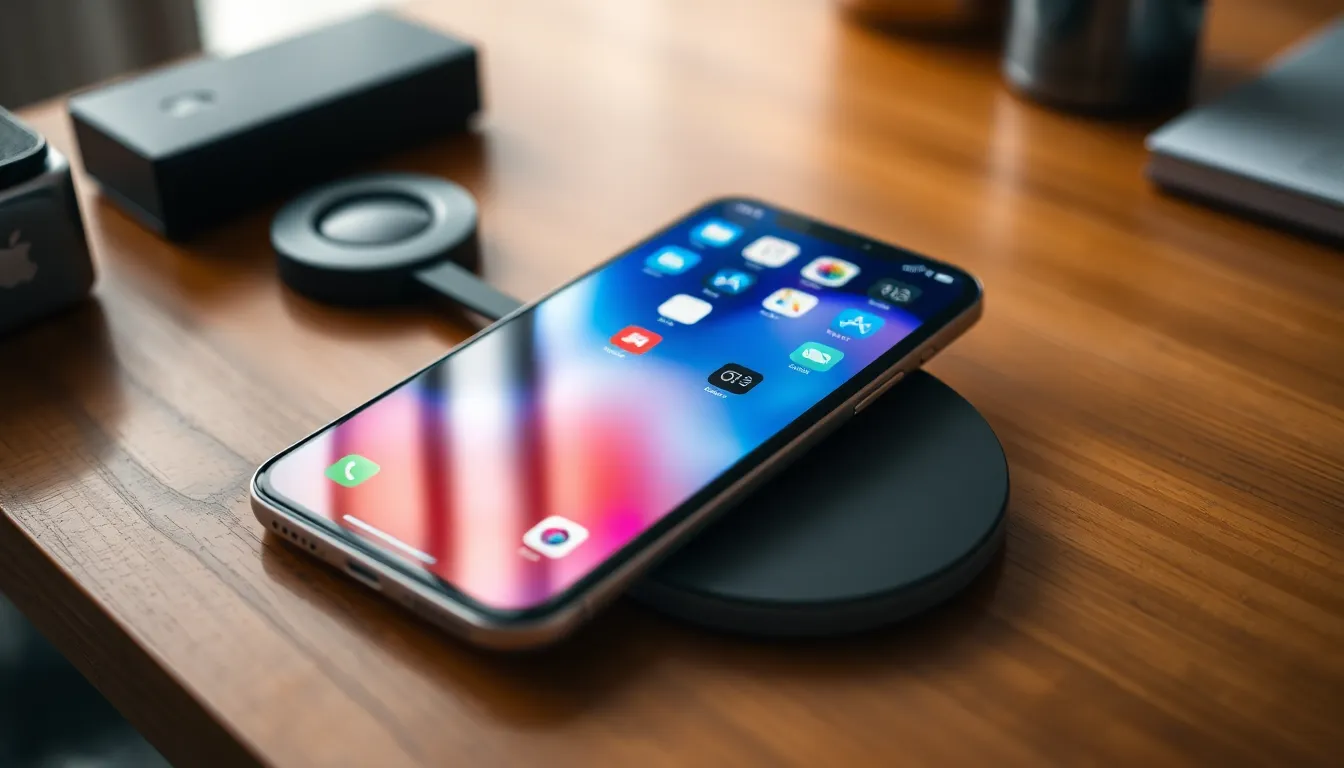When it comes to smartphones, the iPhone 8 has earned its place in the hearts of many. But as technology races forward faster than a caffeinated squirrel, one burning question remains: does the iPhone 8 have 5G? Spoiler alert: it doesn’t. Released in 2017, this beloved device was designed before 5G made its flashy debut, leaving users with a solid 4G experience instead.
While the iPhone 8 may not be the speed demon some users crave, it still packs a punch with its reliable performance and sleek design. So, if you’re considering an upgrade for lightning-fast connectivity, it might be time to explore newer models. But fear not, the iPhone 8 still holds its own in the smartphone arena, just without the 5G hype.
Table of Contents
ToggleOverview of iPhone 8
Released in 2017, the iPhone 8 marked a significant step in Apple’s smartphone evolution. This model sports a 4.7-inch Retina HD display that provides clear visuals and vibrant colors. Equipped with the A11 Bionic chip, the device ensures smooth performance for everyday tasks and applications.
Camera capabilities include a 12 MP rear camera and a 7 MP front camera. These features enhance photography with options like Portrait mode and optical image stabilization. Users appreciate the wireless charging feature, adding convenience to daily use.
Battery life lasts up to 14 hours of talk time, making it suitable for extended use. The iPhone 8 supports only 4G LTE networks, limiting its compatibility with faster data speeds. Despite this limitation, many users continue to favor the device due to its durability and reliability.
Apple included iOS updates for improved security and functionality, maintaining the iPhone 8’s relevance. Some users find its design appealing due to the glass back and aluminum frame, which combine aesthetics with robustness.
Upgrading to newer models offers 5G capability and enhanced features. However, users who value a competent 4G device with solid performance find the iPhone 8 still meets their needs. While technological advancements continue, the iPhone 8 holds a place in the hearts of many loyal Apple fans.
5G Technology Explained

5G technology represents the fifth generation of mobile networks, designed to enhance connectivity significantly. This technology offers faster speeds, lower latency, and the ability to connect more devices simultaneously.
What is 5G?
5G stands for fifth generation wireless technology, succeeding 4G LTE. It utilizes higher frequency bands, allowing for increased data transfer rates. Speeds can reach up to 10 Gbps, making downloads and streaming nearly instantaneous. Enhanced capacity permits thousands of devices to connect within a small area, supporting smart cities and the Internet of Things (IoT). Lower latency, achieving as little as one millisecond, optimizes real-time communications, crucial for applications like remote surgery and autonomous vehicles.
Benefits of 5G Connectivity
5G connectivity provides numerous advantages for users and industries alike. Enhanced download speeds drastically reduce waiting times for content access. Improved latency elevates the performance of online gaming, video conferencing, and virtual reality experiences. Additionally, 5G networks support more devices, enhancing infrastructure in crowded locales. Businesses benefit from advanced applications and services, driving innovations in automation and remote work. Improved connectivity promotes efficiency, competitive advantages, and new opportunities across sectors, from healthcare to entertainment.
iPhone 8 Specifications
The iPhone 8 features specifications that cater to users looking for reliable performance. It showcases a blend of design and functionality that continues to appeal.
Network Capabilities
The iPhone 8 supports 4G LTE networks, offering users decent connectivity speeds. Users can expect download speeds up to 150 Mbps and upload speeds up to 50 Mbps. This device does not support 5G technology, which limits its future-proofing potential. Many users find this sufficient for daily activities like browsing and streaming. Limited network capability highlights why the iPhone 8 remains popular among those who prioritize reliability over cutting-edge technology.
Comparison with Other Models
Compared to newer models like the iPhone 12 and beyond, the iPhone 8 lacks 5G support, which is a significant differentiator. Newer models provide not only 5G capabilities but also enhanced processing power and camera features. The A11 Bionic chip in the iPhone 8 performs well but does not match the speed and efficiency of the A14 or A15 chips found in recent releases. Battery life, however, remains competitive, offering up to 14 hours of talk time. Many users appreciate the affordability of the iPhone 8, making it an attractive option for those unwilling to invest in the latest technology.
Does the iPhone 8 Have 5G?
The iPhone 8 does not support 5G connectivity. Released in 2017, this model predates the advent of 5G technology, offering only 4G LTE capabilities. Users seeking faster mobile internet will find the absence of 5G disappointing, especially as networks continue to upgrade.
Limitations of iPhone 8
Limited network capabilities characterize the iPhone 8. It only supports 4G LTE with maximum speeds of 150 Mbps for downloads and 50 Mbps for uploads. Although it delivers reliable performance in everyday tasks, emerging 5G applications and services remain inaccessible to its users. Moreover, the A11 Bionic chip, while competent, falls short when compared to the newer A14 or A15 chips. Battery life, although lasting up to 14 hours of talk time, may not meet the demands of users engaged in more intensive activities without 5G.
Alternatives to Consider
Several alternatives exist for users desiring 5G functionality. The iPhone 12 and later models offer robust 5G support, delivering faster speeds and improved efficiency. Users can choose from a range of options, including the iPhone 11, which bridges the gap with enhanced features while still being a budget-friendly choice. Competitors like Samsung and Google also provide appealing 5G devices, such as the Samsung Galaxy S21 and Google Pixel 5. These alternatives ensure access to advanced technology and an enhanced user experience without sacrificing reliability.
The iPhone 8 remains a popular choice for users who prioritize reliability and affordability over the latest technology. While it doesn’t support 5G connectivity, its solid 4G performance and enduring design continue to meet the needs of many. With features like a high-quality display and impressive battery life, it stands out as a dependable device in a fast-evolving market. For those who seek the benefits of 5G, newer models like the iPhone 12 or budget-friendly alternatives can provide enhanced connectivity. Ultimately, the iPhone 8 serves as a testament to Apple’s commitment to quality, even as technology advances.




